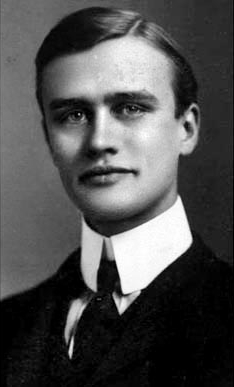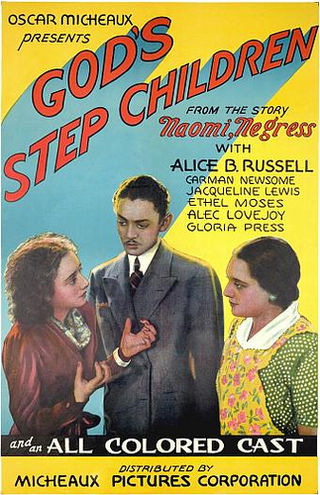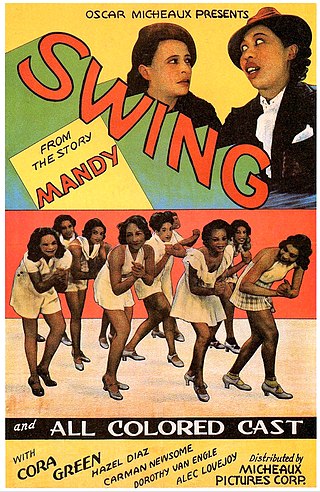Related Research Articles

Oscar Devereaux Micheaux (; was an American author, film director and independent producer of more than 44 films. Although the short-lived Lincoln Motion Picture Company was the first movie company owned and controlled by black filmmakers, Micheaux is regarded as the first major African-American feature filmmaker, a prominent producer of race films, and has been described as "the most successful African-American filmmaker of the first half of the 20th century". He produced both silent films and sound films.

Louis Cameron Gossett Jr. is an American actor. Born in Coney Island, Brooklyn, New York City, he had his stage debut at the age of 17, in a school production of You Can't Take It with You. Shortly after, he successfully auditioned for the Broadway play Take a Giant Step. Gossett continued acting onstage in critically acclaimed plays these include A Raisin in the Sun (1959), The Blacks (1961), Tambourines to Glory (1963) and The Zulu and the Zayda (1965). Also, Gossett added many roles in films and on television to his résumé, as well as released music. In 1977, Gossett gained wide recognition for his role of Fiddler in the popular miniseries Roots, for which he won Outstanding Lead Actor for a Single Appearance in a Drama or Comedy Series at the Emmy Awards.
Birthright is the concept of things being due to a person upon or by fact of their birth, or due to the order of their birth.

Evelyn Preer, was an African American pioneering screen and stage actress, and jazz and blues singer in Hollywood during the late-1910s through the early 1930s. Preer was known within the Black community as "The First Lady of the Screen."

The race film or race movie was a genre of film produced in the United States between about 1915 and the early 1950s, consisting of films produced for black audiences, and featuring black casts. Approximately five hundred race films were produced. Of these, fewer than one hundred remain. Because race films were produced outside the Hollywood studio system, they were largely forgotten by mainstream film historians until they resurfaced in the 1980s on the BET cable network. In their day, race films were very popular among African-American theatergoers. Their influence continues to be felt in cinema and television marketed to African-Americans.

Thomas Sigismund Stribling was an American writer. Although he passed the bar and practiced law for a few years, he quickly began to focus on writing. First known for adventure stories published in pulp fiction magazines, he enlarged his reach with novels of social satire set in Middle Tennessee and other parts of the South. His best-known work is the Vaiden trilogy, set in Florence, Alabama. The first volume is The Forge (1931). He won the Pulitzer Prize for the Novel in 1933 for the second novel of this series, The Store. The last, set in the 1920s, is The Unfinished Cathedral (1934). Both the second and third novels were chosen as selections by the Literary Guild.

The Wages of Sin was a 1929 drama film directed, written and produced by Oscar Micheaux. It was a race movie, featuring an all-black cast, headed by William A. Clayton, Jr. and Bessie Givens. It is considered lost.

Edna Mae Harris, sometimes credited as Edna May Harris was an American actress and singer. Harris, an African–American, was film actress in the late 1930s and early 1940s, appearing in films featuring mostly African–American casts.

Alice Burton Russell was an African-American actress, producer, and the wife of director Oscar Micheaux. She appeared in several films directed by her husband.

Lawrence Chenault was an American vaudeville performer and silent film actor. He appeared in approximately 24 films between years 1920 and 1934; most of his performances were in films directed by pioneering African-American filmmaker Oscar Micheaux. His brother, Jack Chenault, was also a film actor.

God's Step Children is a 1938 American drama film directed by Oscar Micheaux and starring Jacqueline Lewis. The film is inspired by a combination of elements shared from two previously released Hollywood productions, Imitation of Life and These Three.

Swing! is a 1938 American race film directed, produced and written by Oscar Micheaux.

A Daughter of the Congo is a 1930 race film directed, written and produced by Oscar Micheaux. The film is loosely based on the novel The American Cavalryman (1917), by African-American novelist and playwright Henry Francis Downing. It is considered a lost film.
The House Behind the Cedars is a 1927 silent race film directed, written, produced and distributed by the noted director Oscar Micheaux. It was loosely adapted from the 1900 novel of the same name by African-American writer Charles W. Chesnutt, who explored issues of race, class and identity in the post-Civil War South. No print of the film is known to exist, and it is considered lost. Micheaux remade the film in 1932 under the title Veiled Aristocrats.
Birthright is a 1924 silent film by American director Oscar Micheaux. Produced in 10 reels, it is adapted from Thomas Sigismund Stribling's novel of the same title (1922). The film is now lost.
Ethel Moses was an American stage and film actress, and dancer. She was billed as "the black Jean Harlow". Moses is best known for working in films by Oscar Micheaux.

Underworld is a 1937 gangster film directed by Oscar Micheaux, about a recent graduate from an all-black college who moves from the American South to Chicago and gets swept into the criminal underworld. The film was adapted from the short story "Chicago After Midnight" by Edna Mae Baker. Among its stars are Ethel Moses, a Micheaux regular, and Oscar Polk, best known for his appearance in Gone with the Wind two years later.

African American cinema is loosely classified as films made by, for, or about Black Americans. Historically, African American films have been made with African-American casts and marketed to African-American audiences. The production team and director were sometimes also African American. More recently, Black films featuring multicultural casts aimed at multicultural audiences have also included American Blackness as an essential aspect of the storyline.
Tempation is a 1935 American crime film written, produced and directed by Oscar Micheaux. The storyline depicts the corrupting influence of carnal desires. It is considered a lost film.
Carman Newsome was an African-American actor, musician and band conductor in the United States. His work includes leading roles in five Oscar Micheaux films.
References
- 1 2 "AFI|Catalog". catalog.afi.com. Retrieved 2022-02-27.
- ↑ Larry Langman, David Ebner. Hollywood's Image of the South: A Century of Southern Films (2001), p. 95 ISBN 0-313-31886-7. "Birthright (1939), Micheaux. Dir. Oscar Micheaux; Sc. Oscar Micheaux; Cast includes: Carman Newsome, Alec Lovejoy, Ethel Moses. Advertised as "A story of the Negro and the South," Oscar Micheaux's drama is based on the novel by T. S. Stribling."